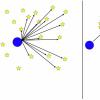First question then would be: Why could with the advent of for example antibiotics, but also vaccinations, some chronic diseases could actually increase?
Antibiotics are often lifesavers, but one possible downside of antibiotics is that early heavy prolonged antibiotic use in young children has been linked to the later development of chronic fatigue syndrome (ME/CFS) and irritable bowel syndrome (IBS).
See this paper: From IBS to ME – The dysbiotic march hypothesis.
I may be an example of this, as I was given many courses of antibiotics as a young child, due to chronic tonsillitis. Eventually I had my tonsils removed, and this fixed the problem. But later in life I developed ME/CFS from a viral infection.
The theory is that under heavy prolonged antibiotic use, bacteria in the body create more biofilm to protect themselves from the antibiotics. Current antibiotics do not penetrate well into biofilm communities of bacteria, so the bacteria are well protected.
So although antibiotics can save lives by quelling an acute infection, they may end up creating persistent biofilm infections, and these biofilms might play a role in diseases such as as IBS and ME/CFS. This is only a theory though.
At present, the race is on to try to find ways of eradicating biofilm infections, as these are clinically significant infections (common in diabetes), and potentially may also underpin a lot of chronic disease.
However, as for the explanation for the increase in other diseases over the last 50 years, such as autoimmune conditions, type 1 diabetes, autism, I suspect global urbanisation and the 1960s sexual revolution may play a role.
If it is true that most chronic diseases, including mental health illnesses, are caused by viruses and bacteria that we catch, then the sexual revolution, which increased people's propensity to promiscuity and having amorous affairs with many partners, will have increased the number of pathogens passed from one person to another. This is because most viruses are spread by saliva, so French kissing is a very efficient way of transmitting a virus from one person to the next.
Remember that although viruses spread easily by normal social contact during their acute infection, once the acute infection is over, and the virus becomes a chronic low-level infection in the body, it is not easily transmitted, because it is only present at very low levels in the saliva during the chronic phase. But if you have a saliva exchange due to French kissing, even at these low levels, the virus can transmit to another person.
Most of the viruses linked to chronic diseases we have not yet developed vaccines for, so we are completely unprotected. The reason we have not developed these vaccines is because most medical researchers do not believe that viruses might be the cause of most chronic diseases, therefore they view pathogens such as Coxsackie B virus as fairly harmless, apart from the acute infections they cause.
But chronic Coxsackie B is linked to numerous nasty chronic diseases, including heart disease, heart valve disease, T1D, ME/CFS, and several others. We desperately need a vaccine for Coxsackie B, but one will not be forthcoming until evidence is presented that Coxsackie B causes all these nasty chronic disease.
The vaccinations we have at present are ones targeted at pathogens that cause damaging acute infections, such as the measles vaccine. Measles can cause death, brain damage and deafness during the acute infection. But we don't have many vaccinations that target pathogens that are linked to chronic disease, because most medical scientists do not appreciate that pathogens may be responsible for most chronic disease and cancers.
And urbanisation brings people into far closer proximity compared to rural living. There has been massive amount of urbanisation right around the world, as we have changed from being primarily a rural farming communities to city dwellers. So humanity has many more opportunities to transmit pathogens from one person to the next.
Edited by Hip, 26 January 2024 - 05:25 PM.


























































